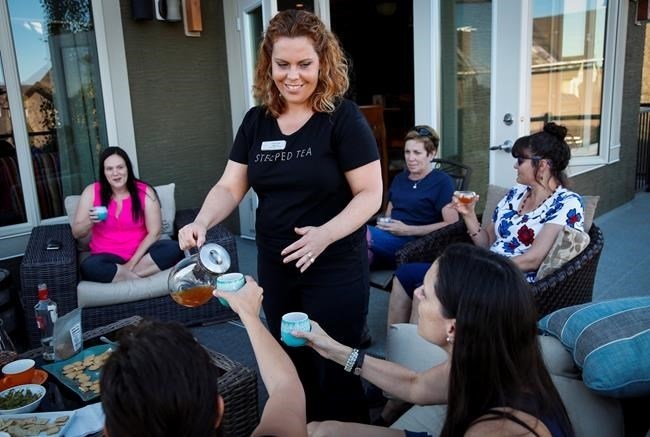
Diana Eves, centre, promotes her product, Steeped Tea, at a home tasting session in Chestermere, Alta., Thursday, July 21, 2016. Multi-level marketing or direct selling is often associated with the heyday of Tupperware parties. It has since ballooned to include folks peddling jewellery, handbags, kitchen gadgets, makeup, leggings and more for companies often touting a profitable side hustle, along with empowerment to mostly female recruits.
Image Credit: THE CANADIAN PRESS/Jeff McIntosh
July 24, 2016 - 6:00 AM
TORONTO - About three years ago, Diana Eves signed up to sell loose leaf tea and recruit salespeople for a company called Steeped Tea on her mother's insistence.
The Calgarian says she now rakes in about $1,300 monthly from commission on her sales and those of some of her recruits. Within the next two years, she plans to leave her retail job.
"Being your own boss is a huge benefit," she says, rattling off a list of other advantages of her gig including flexible work hours and the camaraderie among her team.
This business model referred to as multi-level marketing or direct selling is often associated with the heyday of Tupperware parties. It has since ballooned to include folks peddling jewellery, handbags, kitchen gadgets, makeup, leggings and more for companies often touting a profitable side hustle, along with empowerment to mostly female recruits.
In Canada, nearly 800,000 people attempt to make money this way, according to the Direct Sellers Association of Canada. In the U.S., 20.2 million worked as consultants last year, according to the Direct Selling Association, a jump of 11 per cent from the prior year.
But some say consultants don't stand to profit much and the arrangement can create pressure to supplement a loved one's income.
Multi-level marketing structures are prone to operate as illegal pyramid schemes, said William W. Keep, the dean of the College of New Jersey School of Business, who studies these types of business models.
Some of these companies require consultants purchase a minimum amount of products monthly and can't show sufficient public demand for their goods, he said. The U.S. Federal Trade Commission recently ordered one of them, Herbalife, to restructure its American operations, including ensuring that at least 80 per cent of its product sales come from retail customers.
However, many of these companies maintain they are not pyramid schemes. They can operate legally in Canada, according to the Canadian Consumer Handbook, so long as they abide by the Competition Act, which includes not selling onerous amounts of inventory to consultants.
Eves said she doesn't stock up on Steeped Tea goods, and the company is not a pyramid scheme because it promotes a product and gives all recruits the same opportunity to succeed. She stressed she is not a Steeped Tea employee, so her views don't necessarily reflect those of the company.
Steeped Tea did not make anyone available for an interview or answer questions via email prior to publication.
But just because the companies follow the letter of the law doesn't mean making money is easy.
At Scentsy, a fragrance company, consultants fall into nine tiers, according to a company document posted on their website that shows average annual earnings as of December 2014.
Nearly 65 per cent of its consultants — more than 66,000 — sit on the second tier, where the average worker made US$463.34 in a year.
Top-level directors, of which there are fewer than 200, earned an average of US$113,363.98. The highest earner made nearly US$1 million, while its least profitable director took home just more than US$6,000.
Scentsy also did not make anyone available for an interview or answer questions via email.
The probability of success, Keep said, is not encouraging based on the limited earnings information available from multi-level marketing companies.
People looking for "significant financial gain" rather than social benefits shouldn't sign up, said Ela Veresiu, assistant professor of marketing at York University's Schulich School of Business in Toronto.
"For the fun aspect of it, for the free products, to keep busy — sure," said Veresiu.
Eves says the amount of income one can earn boils down to one thing.
"The bottom line is the same: it's your motivation," she said. "If there's six people on your block that sell Steeped Tea, I guess you're just going to have to try a little harder."
But "unintended negative consequences" of this sales model, said Veresiu, include straining social relationships through sales efforts.
U.S. humour writer Rachael Pavlik captured this sentiment in a satirical rant published last November on Scary Mommy, an online parenting publication, about why she's no longer shelling out dollars for products her friends sell.
In an interview, Pavlik said at one point, she would receive a couple of invitations a week to attend sales parties. She bought several things before she stopped going.
"It just feels very phoney to me and it's like I'm just a prospect for you to make more money," she said of recruiting friends to a sales force.
"A good way to lose friends is to push people into something that they don't want to do so that you can make money."
Eves said she avoids that tension by focusing her recruitment efforts on strangers and not targeting individuals in her social media posts about products.
Still, she acknowledges friendships may fall apart if the seller feels judged and the friend feels obligated.
"I think that you've got to watch that on both sides."
News from © The Canadian Press, 2016